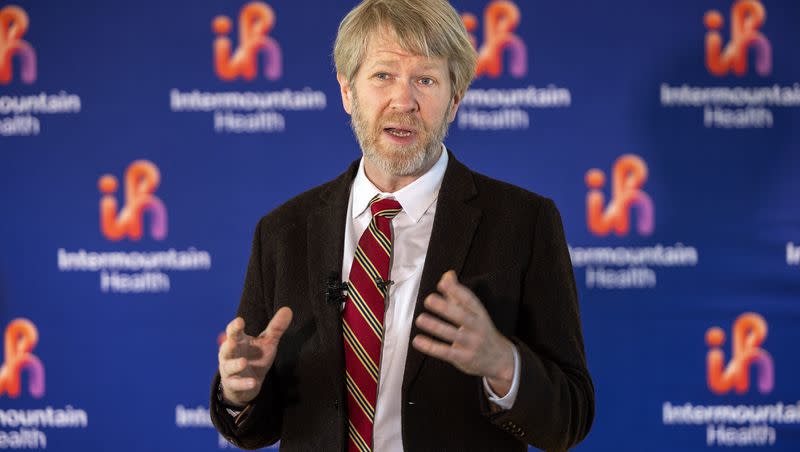How Intermountain Health is working to improve outcomes for critically ill patients

For decades, very little has been known about treating acute respiratory distress syndrome, pneumonia and sepsis — but that might be set to change.
“The reality is that ARDS and pneumonia and sepsis, which are pretty similar syndromes, are really like bananas and oranges and apples and papayas and guavas and we've just been treating them all as if they were a fruit and what works for apples ought to work for the rest,"“said Dr. Samuel Brown, vice president for research and research professor at Intermountain Health.
Intermountain Health on Tuesday announced that it has been selected as one of six core health care systems from a larger group of 22 hospitals across the country, and a clinical coordinating center at the Vanderbilt University Medical Center, to lead a national effort to improve treatment for patients with acute respiratory distress syndrome, pneumonia and sepsis — the most common and debilitating conditions found in critically ill patients.
Together, acute respiratory distress syndrome, pneumonia and sepsis kill hundreds of thousands of people in the U.S. each year. Acute respiratory distress syndrome and sepsis are most often caused by pneumonia, which is a syndrome itself, with poor results: up to 50% mortality rate, and for survivors there's often a reduced quality of life and an ongoing risk for early death, according to a press release from Intermountain Health.
The federally funded initiative will provide a $51.6 million grant from the National Institutes of Health for the hospitals to gather information about 5,000 patients across the country to better understand what's happening to them during and after the illnesses.
"What we're really trying to do is identify, 'What are these meaningful subtypes of these big syndromes so that we can get specific treatments to people,'" Brown said. "A lot of us are very optimistic that this will be the crucial next step in finding potential effective treatments for these devastating illnesses."

The consortium will start enrolling patients by early 2024, according to a release from Intermountain Health.
"It's fully done by consent and they'll be invited to participate in this national, 5,000-patient cohort. We'll learn about what's happening to them in the hospital or an intensive care unit," Brown said, adding that researchers will study patients by collecting information on them through assessments like blood and genetic tests.
"We want to make sure that we understand not only what determines whether you live or die from the acute illness, but for those who are fortunate enough to survive, what are the right ways to work with them to maximize their health and flourishing as they survive," he added.
Additionally, the initiative will utilize advanced technologies such as artificial intelligence and machine learning to improve patient treatment. Specifically, AI can be harnessed to identify patterns who otherwise wouldn't be identified — a function that Intermountain Health and the rest of the health care systems will be leaning into.

"One of the core features of what we'll be doing in this consortium is in fact using AI machine learning to take the hundreds and thousands of variables associated with each individual and try to summarize those thousands of variables into discrete groups or subtypes," Brown said.
This will feed into the consortium's goal of better understanding different types of acute respiratory distress syndrome, pneumonia and sepsis with an end objective to develop more targeted, specific treatments.
For Brown and Intermountain Health, the opportunity to function as one of the six lead sites of the consortium — along with the University of California San Francisco, the University of Colorado, the University of Michigan, the University of Pennsylvania and Vanderbilt University Medical Center — is a testament to the power of Intermountain's legacy.
"We now are able to continue to lead the national scientific investigations and coordinated planning around these areas," Brown said. "I love Utah for a lot of reasons and one of the key reasons I love it is (because) I get to work at Intermountain with the teams at Intermountain (and) with the communities that Intermountain cares for."

